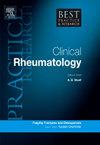系统性红斑狼疮患者与临床医生之间的沟通差距以及患者报告结果的重要性。
IF 4.8
2区 医学
Q1 RHEUMATOLOGY
Best Practice & Research in Clinical Rheumatology
Pub Date : 2023-12-01
DOI:10.1016/j.berh.2024.101939
引用次数: 0
摘要
系统性红斑狼疮(SLE)给患者的生活带来了沉重的负担。患者和医生对疾病的关注点大相径庭。医生关注的重点是控制疾病活动以防止损害累积,而患者关注的重点则是影响健康相关生活质量(HRQoL)的症状。我们探讨了医生和患者的观点以及患者报告结果(PROs)的潜在作用。医生意识到,从患者的角度收集信息,PROs 在理论上是有用的。但是,他们往往不知道如何在实际的共同治疗策略中解释和使用这些问卷。对病人来说,重要的是要将他们视为一个完整的人,真正考虑到他们的感受和功能。帮助弥合沟通鸿沟的策略可以包括:更好地利用就诊时间、为咨询做好准备、医生使用更易理解的非专业语言、专职护士。本文章由计算机程序翻译,如有差异,请以英文原文为准。
The communication GAP between patients and clinicians and the importance of patient reported outcomes in Systemic Lupus Erythematosus
Systemic Lupus Erythematosus (SLE) imposes a great burden on the lives of patients. Patients' and physicians' concerns about the disease diverge considerably. Physicians focus on controlling disease activity to prevent damage accrual, while patients focus on symptoms that impact on Health-Related Quality of Life (HRQoL). We explored the physicians' and patients' perspective and the potential role of Patient Reported Outcomes (PROs). Physicians are aware of the theoretical usefulness of PROs to collect information deriving from the patients' perspective. However, they often do not know how to interpret and use these questionnaires in a real shared therapeutic strategy.
For the patients, it’s important to be seen as a whole person with a true consideration of how they feel and function. Strategies to help bridge the communication gap could include: better use of time during visits, preparing for the consultation, a more understandable lay language used by the doctor, a dedicated nurse.
求助全文
通过发布文献求助,成功后即可免费获取论文全文。
去求助
来源期刊
CiteScore
9.40
自引率
0.00%
发文量
43
审稿时长
27 days
期刊介绍:
Evidence-based updates of best clinical practice across the spectrum of musculoskeletal conditions.
Best Practice & Research: Clinical Rheumatology keeps the clinician or trainee informed of the latest developments and current recommended practice in the rapidly advancing fields of musculoskeletal conditions and science.
The series provides a continuous update of current clinical practice. It is a topical serial publication that covers the spectrum of musculoskeletal conditions in a 4-year cycle. Each topic-based issue contains around 200 pages of practical, evidence-based review articles, which integrate the results from the latest original research with current clinical practice and thinking to provide a continuous update.
Each issue follows a problem-orientated approach that focuses on the key questions to be addressed, clearly defining what is known and not known. The review articles seek to address the clinical issues of diagnosis, treatment and patient management. Management is described in practical terms so that it can be applied to the individual patient. The serial is aimed at the physician in both practice and training.

 求助内容:
求助内容: 应助结果提醒方式:
应助结果提醒方式:


